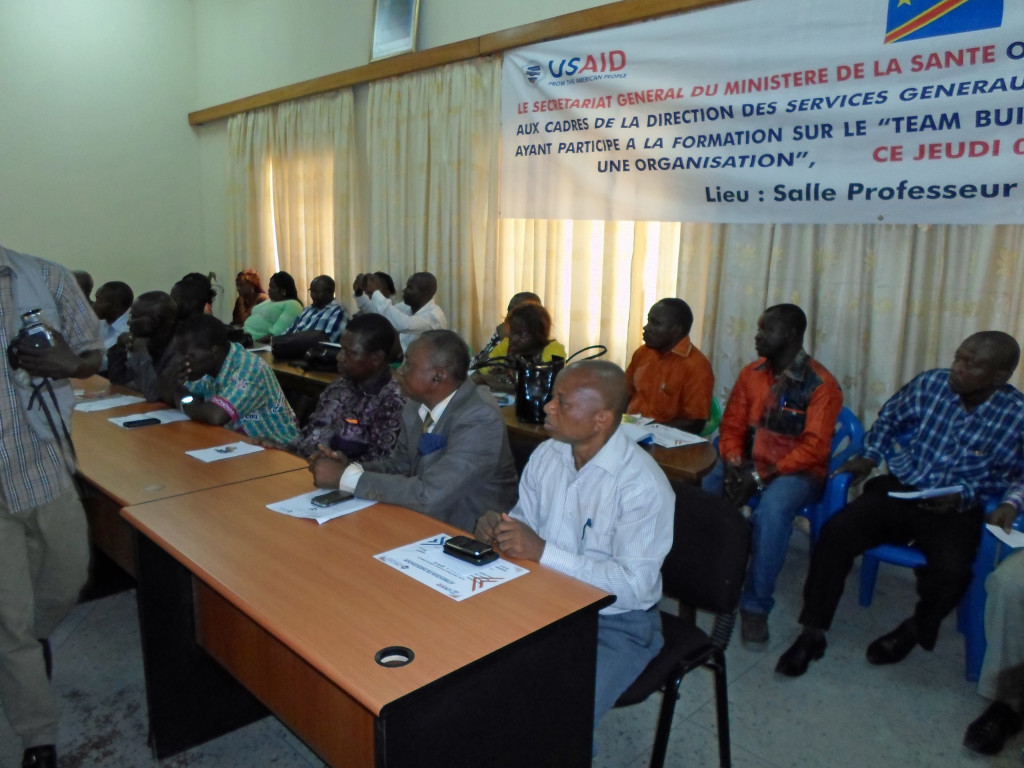The Democratic Republic of the Congo (DRC) has traditionally operated in a highly centralized manner, with limited authorities delegated to the subnational levels. But in 2006, the new constitution made several profound institutional reforms based on the principles of decentralization. In the health sector, this reform has significant implications.
Provinces gained the authority to hire and manage the health workforce; develop, support, and supervise health programs consistent with the national health development plan; manage hospital, laboratory, and pharmaceutical services; promote primary health care services at the facility and community levels; and disseminate and enforce health laws and regulations.
Under the decentralization reforms, the central Ministry of Public Health (Ministère de la Santé Publique, MSP) has been progressively moving toward establishing the new provincial health divisions (DPS’s), consolidating the number of central directorates from 13 to 7, and downsizing the number of central directorate staff from 1,012 to 598.
While much conceptual work on the reform has been accomplished, much has yet to be implemented, especially in the area of institutional strengthening. The HFG project is assisting in the implementation of the reforms at the central and provincial levels.
In addition to supporting the MOH reform, HFG is also providing support to the Kinshasa School of Public Health (KSPH). The project’s work with KSPH involves strengthening its financial management system so that it can receive funding directly from USAID and financially supporting a scholarship program. HFG began its activities in the DRC in early 2015.

Participants at one of HFG’s team building workshops in 2015.
Ministry of Health Reform at the Central and Provincial Levels
At the central level, HFG’s focus is the institutional strengthening of three central directorates within the MSP: the Directorate of General Services and Human Resources, the Directorate of Administration and Financial Affairs, and the Directorate of Organization and Management of Healthcare Services. Assistance includes leadership and management training, clarification of roles and responsibilities under the new structure, strategic and operational planning, strengthening teamwork, and modest information and communications technology support.
At the provincial level, HFG is supporting the establishment of DPS’s in Lualaba and Haut-Katanga provinces. HFG’s assistance—similar to the capacity building and institutional strengthening support to the national level directorates— will help these DPS’s function effectively under the decentralized system. HFG will also work to strengthen the provincial coordinating committee. In 2015, in both provinces HFG helped develop the first annual operational plans, and conducted a situation analysis for the 2016 operational plan.
In 2016 HFG and KSPH will also train MSP, DPS, and other central ministry staff on the basic concepts and principles of decentralization—ensuring understanding of decentralization by key decision-makers.
Supporting the Kinshasa School of Public Health: Financial Management and Scholarships
KSPH is the premier institution in the DRC for training public health professionals, many of whom become managers at different levels of the health system, with some becoming national public health leaders. The core focus of the school is its master’s-level programs in public health. The school is highly sought-after by a wide range of donors and implementing partners for partnership on various activities. HFG support to KSPH builds on USAID accomplishments under the predecessor Health Systems 20/20 project.
USAID has provided funding for scholarships to KSPH for many years. In the academic year 2015-2016, HFG supported a scholarship program for 30 MPH and 3 PhD students. The scholarships are intended to allow students to attend the school regardless of financial needs.
HFG is working to strengthen KSPH’s financial management capacity to position the school to become a direct recipient of USAID funding for the school and scholarship program. Support includes bringing financial management systems up to generally accepted accounting standards, and ensuring commitment from the school’s management committee to strengthen those systems. By the end of 2015, HFG had assisted in revising KSPH’s financial procedures manual, installing new accounting software, and strengthening the finance department. The development of a consolidated financial system, including core academic programs and over 20 research projects, is also underway.
Announcements and successes
Publications
Media Mentions:
- June 2016
- L’Avenir: « Le weekend dernier: T. Mbemba clôture le cours sur la décentralisation dans le secteur de la santé »
- L’Avenir, Partenariat UNIKIN-Harvard – « Des cadres du ministère de la Santé à l’école de la décentralisation »



